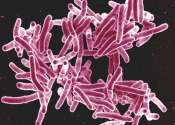The American Society for Microbiology (ASM) is a professional organization for scientists who study viruses, bacteria, fungi, algae, and protozoa as well as other aspects of microbiology. Microbiology is the study of organisms too small to be seen with the naked eye and which must be viewed with a microscope. ASM membership includes scientists who do basic research into the nature and lives of viruses, bacteria, and other microorganisms. ASM membership also includes scientists who work in the field of applied microbiology, for example, researching cures for diseases caused by microorganisms, or the potential for microorganisms to create cheeses from milk, to generate fuels, or to clean up oil spills.
ASM was founded in 1899 under the name the "Society of American Bacteriologists." In December 1960, it was renamed the "American Society for Microbiology."
- Website
- http://www.asm.org/
- Wikipedia
- http://en.wikipedia.org/wiki/American_Society_for_Microbiology
Some content from Wikipedia,
licensed under CC BY-SA
Subscribe to rss feed









